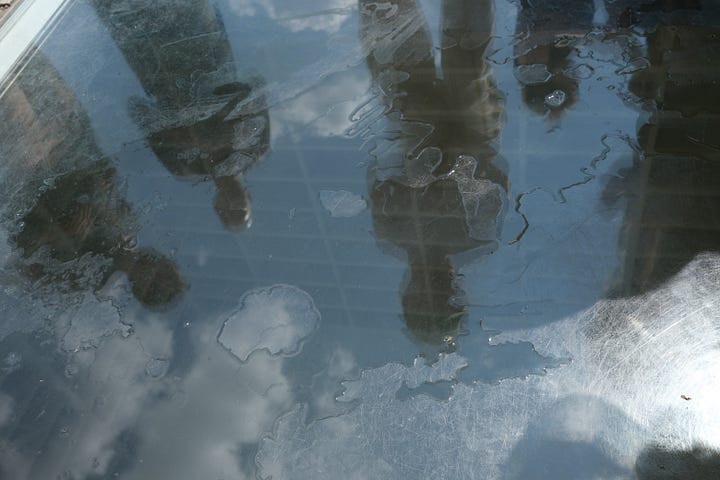How to lose a book
Why we must stand up for libraries
“We think that today it is rather more difficult to lose a book, that the numerous virtual supports we rely on to preserve them precludes the risk of anything being definitively destroyed. Yet it seems to me that this very immateriality may in certain cases prove to be as precarious as old-fashioned paper…”
-Giorgio van Straten, In Search of Lost Books
Simon Carnell and Erica Segre, translators.
Ever since the executive order threatening to dismantle the Institute of Museum and Library Services last week1, I can’t stop thinking about the Berlin Book Festival and the square where it’s held.
Babelplatz, along the boulevard Unter den Linden that leads to the Brandenberg Gate, is the site of a massive book burning on May 10, 1933. Those hurling books into the flames weren’t political extremists, but students. How does this happen?
Today, walking into the square, visitors pass a transparent panel on the ground. Peering through, a room with floor-to-ceiling bookshelves as walls stands empty of a single book. This is the memorial to the books lost to the flames.


What does it mean to lose a book?
Before the potential to digitize a book, losing it was as easy as misplacing or destroying the physical manuscript. Giorgio van Straten provides multiple examples of this in his book. However, with the exception of Sylvia Plath, he only looked at male authors who had already published other work. This isn’t the only way to lose books.
To live in Germany, especially in Berlin, is to live with one foot in the present and the other in the previous century. Many places carry their former eras on their backs, but Berlin has an extra helping of baggage. Plaques on the ground remind us of people who were taken and murdered by the regime. We can follow the tracks of the wall that came after the war. And we see the shelves that might have held books if not for the flames in our public squares.
In a more optimistic time, I wrote about my joy at seeing a Book Festival in Babelplatz that featured books in multiple languages spoken on the streets of the city: German, French, English, Ukrainian, and Arabic. Despite the heat of the day reducing those working in food carts to sweaty messes, the space was peaceful and joyful.
Upon learning that the current administration in the US has determined that the primary federal funding source for libraries and museums is “unnecessary,”2 the fear of lost books has become ever more real.
Is a book lost only if it no longer exists, or is it also lost if people can no longer access it? For many parts of the country, libraries are essential to accessing books. Even if books are available for purchase, it doesn’t mean everyone can afford them.
Books off limits
This order doesn’t come as a surprise, even if it is a disappointment. We haven’t had a public demonstration burning books in the US, but we have seen an increase in censorship, particularly in school libraries and curricula.
Perhaps a book hasn’t disappeared everywhere, but if teachers and librarians can’t provide books to students who would benefit from them, is that a meaningful difference?
The funding from Institute of Museum and Library Services keeps libraries open in rural communities, in Indigenous communities, and in low-income communities. Taking library services from these areas erases resources from where they are sorely needed. How does this serve the country?
Whose books are we able to find?
In reading van Straten’s book this past weekend, I become increasingly frustrated at its limitations. Yes, it was sad that these well-known authors had written books we’ll never be able to read, but what about those who want to write books and are never able to do so?
Writing is most often born from a love of reading. As a kid who devoured books from an early age, my dream of writing stemmed from love of what I’d read. Kids who don’t have open and free access to books won’t dream of writing them.
Not only that, but as words are erased from public record, including mention of women, people of color, the queer population and more, we can no longer be confident in the story being told. Libraries are a place we can return to the past and find some evidence of what happened. But if we close them, this access is gone.
If we don’t support everyone to access research and inspiration, the new stories never appear to contribute to the conversation.
Devaluing writing
Beyond the threat to libraries, authors took a huge hit this past week, learning that Meta used millions of books in a pirated archive to train AI without the authors’ or publisher’s consent.3
As Alex Reisner wrote in The Atlantic,
“LibGen and other such pirated libraries make information more accessible, allowing people to read original work without paying for it. Yet generative-AI companies such as Meta have gone a step further: Their goal is to absorb the work into profitable technology products that compete with the originals. Will these be better for society than the human dialogue they are already starting to replace?”
Training AI with literature allows Ai to get better at copying its source data. And yet, the thousands of authors who struggled to write these books are the collateral. The impact has been heartbreaking. Daisy Buchanan wrote eloquently about her discovery that her books were among those stolen. Nearly every writer I’ve been in touch with this week has reported their books on the list, too.
If theft of writing at this level is deemed reasonable at the upper levels of business, what does this say to those pondering writing their own books? If authors work for years, uncertain of ever getting royalties they can live on, only to have their hard work stolen to power a machine designed to replace them, why would they want to continue?
If writing is a career that doesn’t reward authors, how can we encourage people from all walks of life to share their knowledge and experience? If people who dream of writing are prevented from doing so, we all lose.

Time to make a choice
People have always communicated through story. Story is a central part of what makes us human. Over twenty years ago, when I was getting my masters in psychology, my professors told us that humans are meaning-making beings.
We experience the world, but we are human when we give meaning to that experience. The narrative we build about who we are and who we are capable of becoming is what allows us to grow.
Books are our source of these stories. We can learn how someone lived in another time and place, or even how someone else lives right now inside books. This is only possible so long as books are protected.
Libraries are one of our greatest resources. Museums are another. The record of how humans have lived allows us to learn from mistakes that have been made before.
As I walk through Babelplatz now, looking down into the empty shelves below, I can’t help asking, “Do we really need to learn this lesson again?”
What you can do to help
Please speak up about this issue. If you care about libraries, renew your library card and get the Libby app so you can utilize library services.
Libby and Overdrive work internationally. Get an account and get a library card where you live, no matter the country. Libraries generally receive funding based on how actively they are used. Use your libraries. Show the world they are important.
In the US:
The American Library Association has a helpful page with links to take action here.
Direct link to write your representatives is here.
If anyone has additional resources or recommendations, please share them in the comments below. This post will remain free for everyone so we can use it as a community reference.
https://www.whitehouse.gov/presidential-actions/2025/03/continuing-the-reduction-of-the-federal-bureaucracy/
https://www.whitehouse.gov/presidential-actions/2025/03/continuing-the-reduction-of-the-federal-bureaucracy/ See “Section 1. Purpose”
https://www.theatlantic.com/technology/archive/2025/03/libgen-meta-openai/682093/





I remember when music and art were deemed unimportant in the school curriculum, and programs were cut to save money. And then people wondered why kids were on the streets and joining gangs. Music and art and literature feed the human soul and if we don’t nourish our soul, what is left? We don’t just want books because some of us happen to love them, we need books to keep us human.
I grew up in a rural community and we had a very small school library. The weekly visit from the Book Mobile was the highlight of the school day. This is breaking my already broken heart.